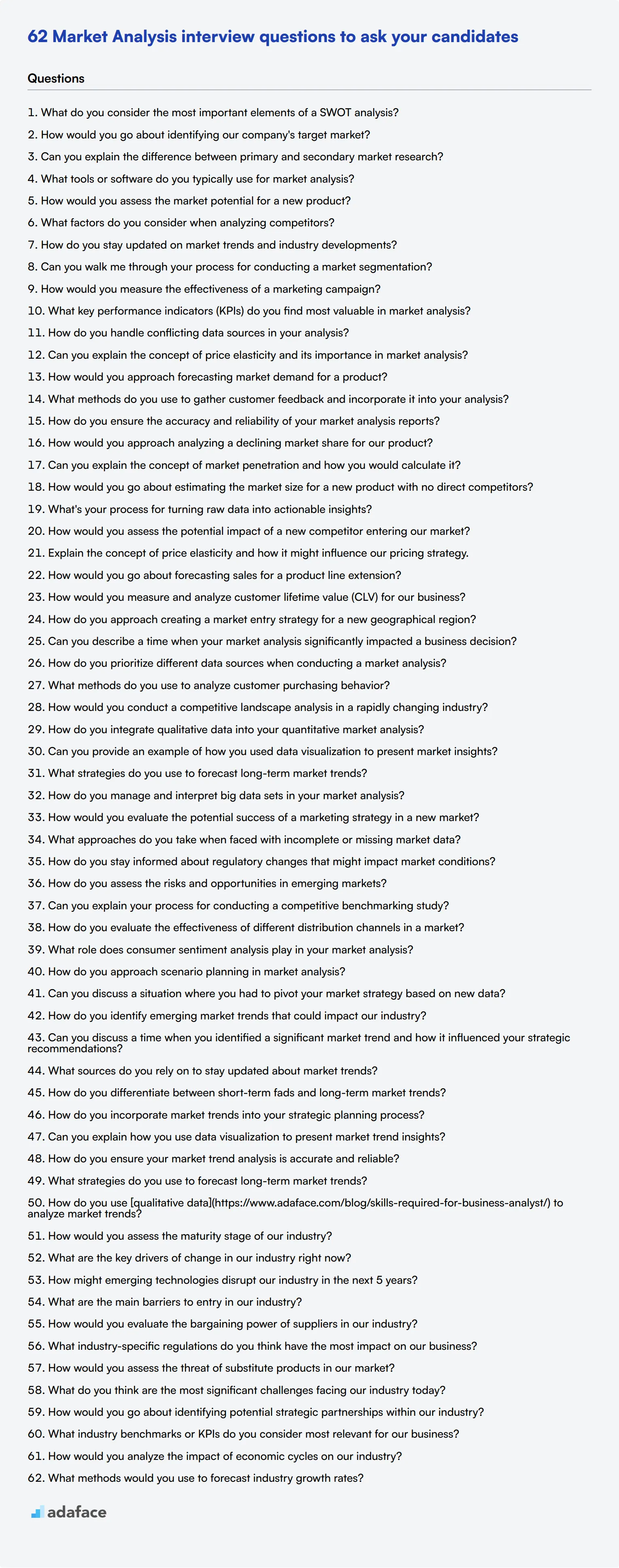Conducting a market analysis interview can be challenging, especially when trying to distinguish between proficient and exceptional candidates. Assessing their skills during the interview phase is critical to ensure you add the right talent to your team.
This blog post provides a comprehensive list of market analysis interview questions tailored for various levels, including basic, junior, senior, and questions focusing on market trends and industry insights. These targeted questions will help you evaluate candidates effectively and make informed hiring decisions.
By leveraging this list, you can streamline your interview process and identify the best candidates for your market analysis roles. For a more thorough evaluation, consider using our Market Research Test before conducting interviews.
Table of contents
15 basic Market Analysis interview questions and answers to assess candidates
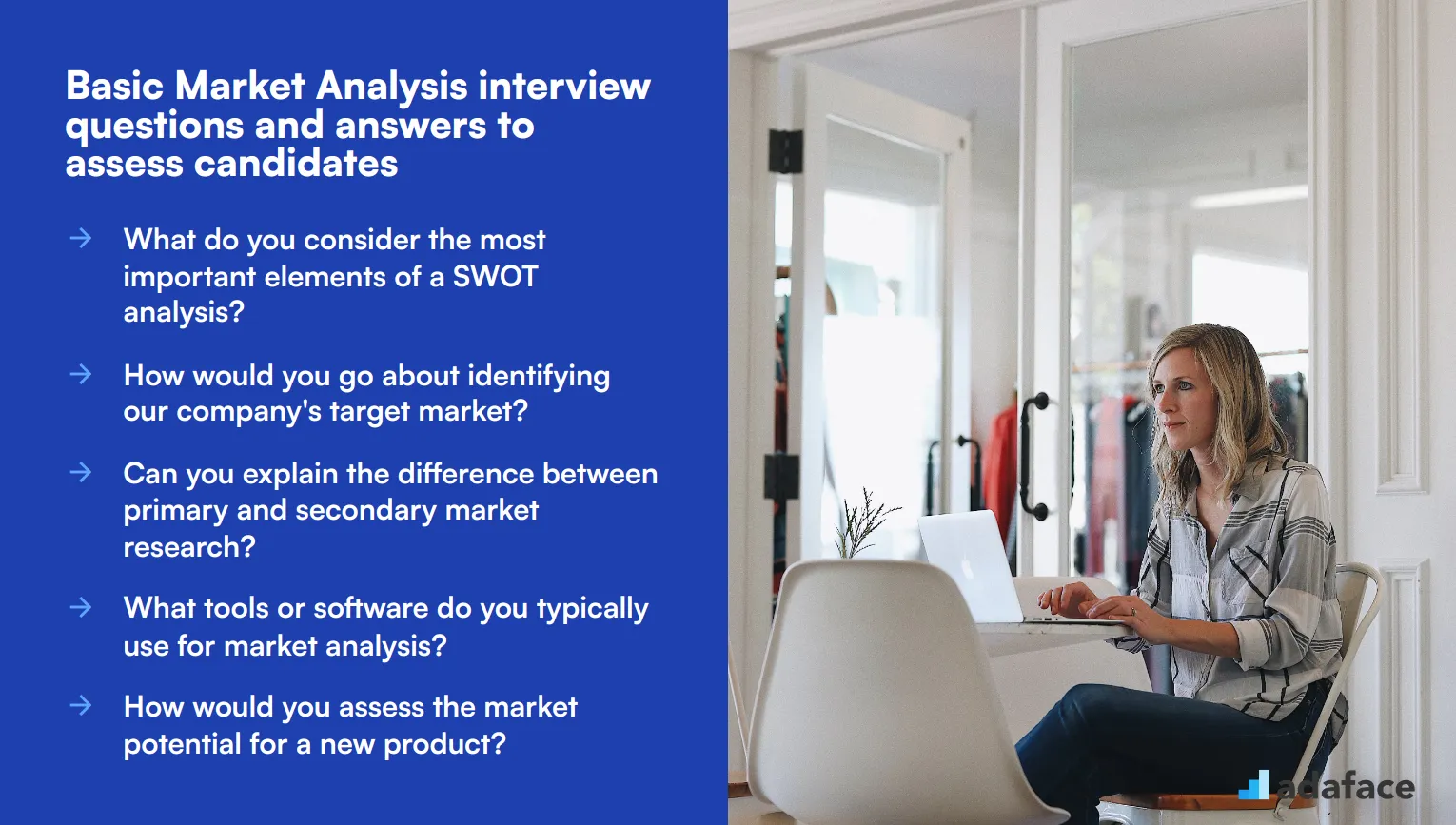
To assess candidates' fundamental understanding of market analysis, use these 15 basic questions during interviews. These questions will help you evaluate a candidate's market analysis skills and their ability to contribute to your organization's strategic decision-making process.
- What do you consider the most important elements of a SWOT analysis?
- How would you go about identifying our company's target market?
- Can you explain the difference between primary and secondary market research?
- What tools or software do you typically use for market analysis?
- How would you assess the market potential for a new product?
- What factors do you consider when analyzing competitors?
- How do you stay updated on market trends and industry developments?
- Can you walk me through your process for conducting a market segmentation?
- How would you measure the effectiveness of a marketing campaign?
- What key performance indicators (KPIs) do you find most valuable in market analysis?
- How do you handle conflicting data sources in your analysis?
- Can you explain the concept of price elasticity and its importance in market analysis?
- How would you approach forecasting market demand for a product?
- What methods do you use to gather customer feedback and incorporate it into your analysis?
- How do you ensure the accuracy and reliability of your market analysis reports?
8 Market Analysis interview questions and answers to evaluate junior analysts
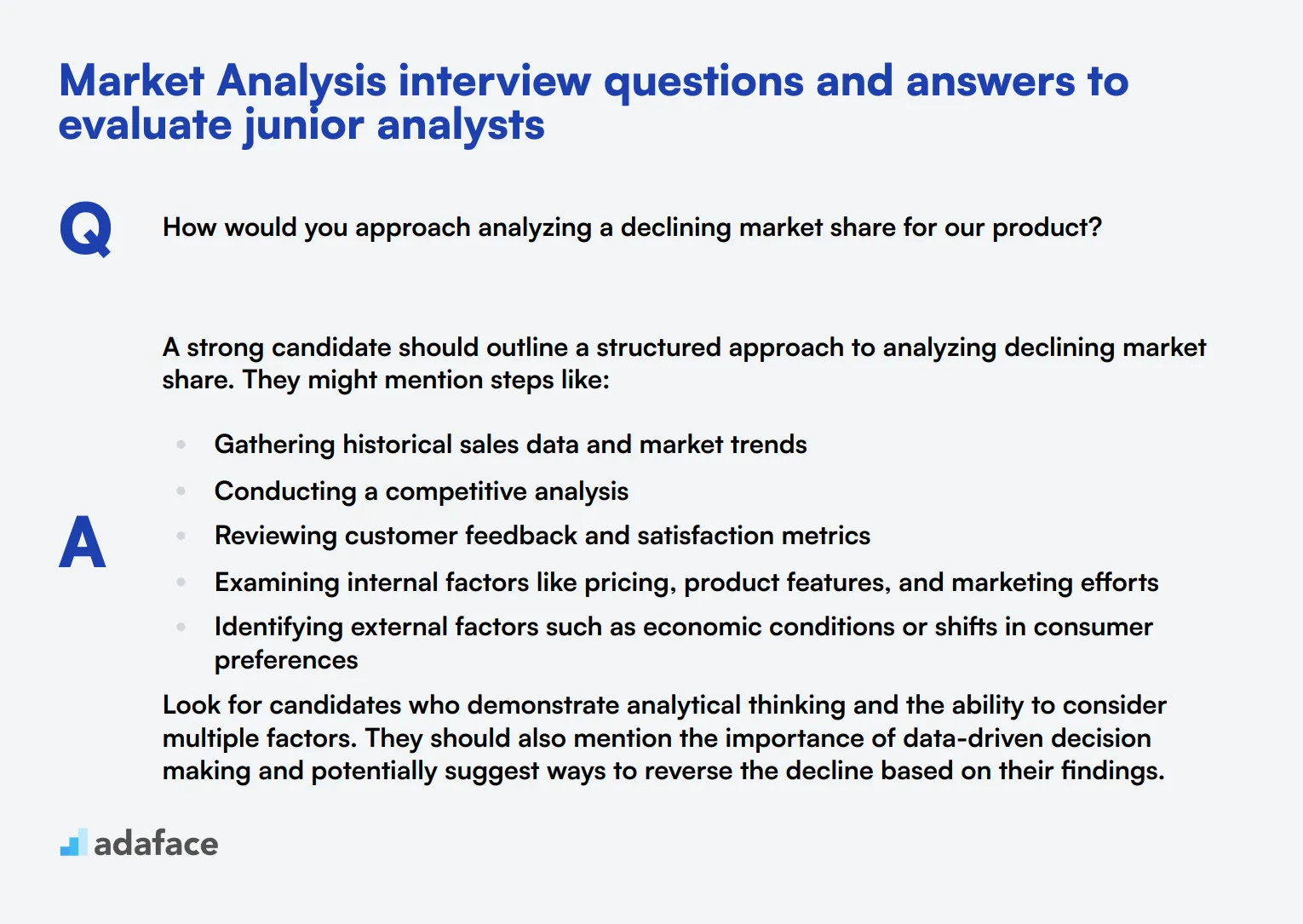
Ready to put your junior market analysts through their paces? These 8 questions will help you assess their analytical prowess and business acumen. Use them to gauge candidates' ability to think critically, interpret data, and provide actionable insights. Remember, the best analysts can explain complex concepts simply, so pay attention to their communication skills too!
1. How would you approach analyzing a declining market share for our product?
A strong candidate should outline a structured approach to analyzing declining market share. They might mention steps like:
- Gathering historical sales data and market trends
- Conducting a competitive analysis
- Reviewing customer feedback and satisfaction metrics
- Examining internal factors like pricing, product features, and marketing efforts
- Identifying external factors such as economic conditions or shifts in consumer preferences
Look for candidates who demonstrate analytical thinking and the ability to consider multiple factors. They should also mention the importance of data-driven decision making and potentially suggest ways to reverse the decline based on their findings.
2. Can you explain the concept of market penetration and how you would calculate it?
Market penetration is a measure of how much a product or service is being used by customers compared to the total estimated market for that product or service. It's typically expressed as a percentage.
The calculation for market penetration is:
Market Penetration = (Number of Customers / Total Target Market) x 100
A good candidate should be able to explain this concept clearly and provide the formula. They might also mention that market penetration can be used to assess the growth potential of a product or service in its current market.
3. How would you go about estimating the market size for a new product with no direct competitors?
Estimating market size for a novel product requires creativity and thorough research. A strong candidate might suggest the following approach:
- Define the target audience based on the product's features and benefits
- Research demographic data to quantify the potential customer base
- Conduct surveys or focus groups to gauge interest and potential adoption rates
- Look at analogous products or services in adjacent markets
- Use the 'jobs to be done' framework to identify the need the product fulfills
- Estimate the value proposition and potential pricing
Look for candidates who demonstrate a systematic approach and the ability to think outside the box. They should also mention the importance of validating assumptions and refining estimates as more data becomes available.
4. What's your process for turning raw data into actionable insights?
A strong candidate should outline a clear, step-by-step process for data analysis. They might describe a process like:
- Define the business question or objective
- Collect and clean the relevant data
- Explore the data to identify patterns and anomalies
- Perform statistical analysis or create visualizations
- Interpret the results in the context of the business question
- Develop recommendations based on the insights
- Communicate findings effectively to stakeholders
Look for candidates who emphasize the importance of starting with a clear objective, maintaining data integrity, and translating analytical findings into practical business recommendations. Strong candidates might also mention the iterative nature of this process and the importance of critical thinking throughout.
5. How would you assess the potential impact of a new competitor entering our market?
Assessing the impact of a new competitor requires a comprehensive analysis. A strong candidate might suggest the following approach:
- Analyze the competitor's product offerings, pricing strategy, and target market
- Assess their financial backing and resources
- Evaluate their marketing and distribution strategies
- Compare their value proposition to yours
- Estimate potential market share they might capture
- Analyze how existing customers might respond
- Consider potential impacts on pricing and profitability
Look for candidates who demonstrate strategic thinking and the ability to consider multiple scenarios. They should also mention the importance of ongoing monitoring and the need to prepare potential response strategies.
6. Explain the concept of price elasticity and how it might influence our pricing strategy.
Price elasticity of demand measures how sensitive consumer demand is to changes in price. It's calculated as the percentage change in quantity demanded divided by the percentage change in price.
A strong candidate should explain that:
- If demand is elastic (elasticity > 1), a small change in price leads to a larger change in demand
- If demand is inelastic (elasticity < 1), changes in price have less impact on demand
- This concept is crucial for pricing strategy as it helps determine how price changes might affect revenue
Look for candidates who can explain how understanding price elasticity can inform decisions on pricing, promotions, and product positioning. They might also mention factors that influence elasticity, such as availability of substitutes or whether the product is a necessity or luxury.
7. How would you go about forecasting sales for a product line extension?
Forecasting sales for a product line extension requires a blend of quantitative and qualitative analysis. A strong candidate might suggest an approach like:
- Analyze historical sales data of similar products or previous line extensions
- Assess market trends and growth rates in the product category
- Evaluate the unique selling proposition of the new product
- Conduct market research to gauge customer interest and potential adoption rates
- Consider cannibalization effects on existing products
- Factor in planned marketing and distribution efforts
- Use statistical methods like regression analysis or time series forecasting
Look for candidates who demonstrate a systematic approach and the ability to combine various data sources. They should also mention the importance of creating multiple scenarios (best case, worst case, most likely) and continuously refining forecasts as new data becomes available.
8. How would you measure and analyze customer lifetime value (CLV) for our business?
Customer Lifetime Value (CLV) is a prediction of the net profit attributed to the entire future relationship with a customer. A strong candidate should explain that CLV typically involves calculating:
- Average purchase value
- Purchase frequency
- Customer lifespan
- Customer acquisition cost
- Retention rate and churn rate
The basic formula is: CLV = (Average Purchase Value x Purchase Frequency x Customer Lifespan) - Customer Acquisition Cost
Look for candidates who understand the importance of CLV in guiding marketing spend, customer retention efforts, and overall business strategy. They should also mention that CLV analysis can help identify high-value customer segments and inform personalized marketing strategies.
18 advanced Market Analysis interview questions to ask senior analysts
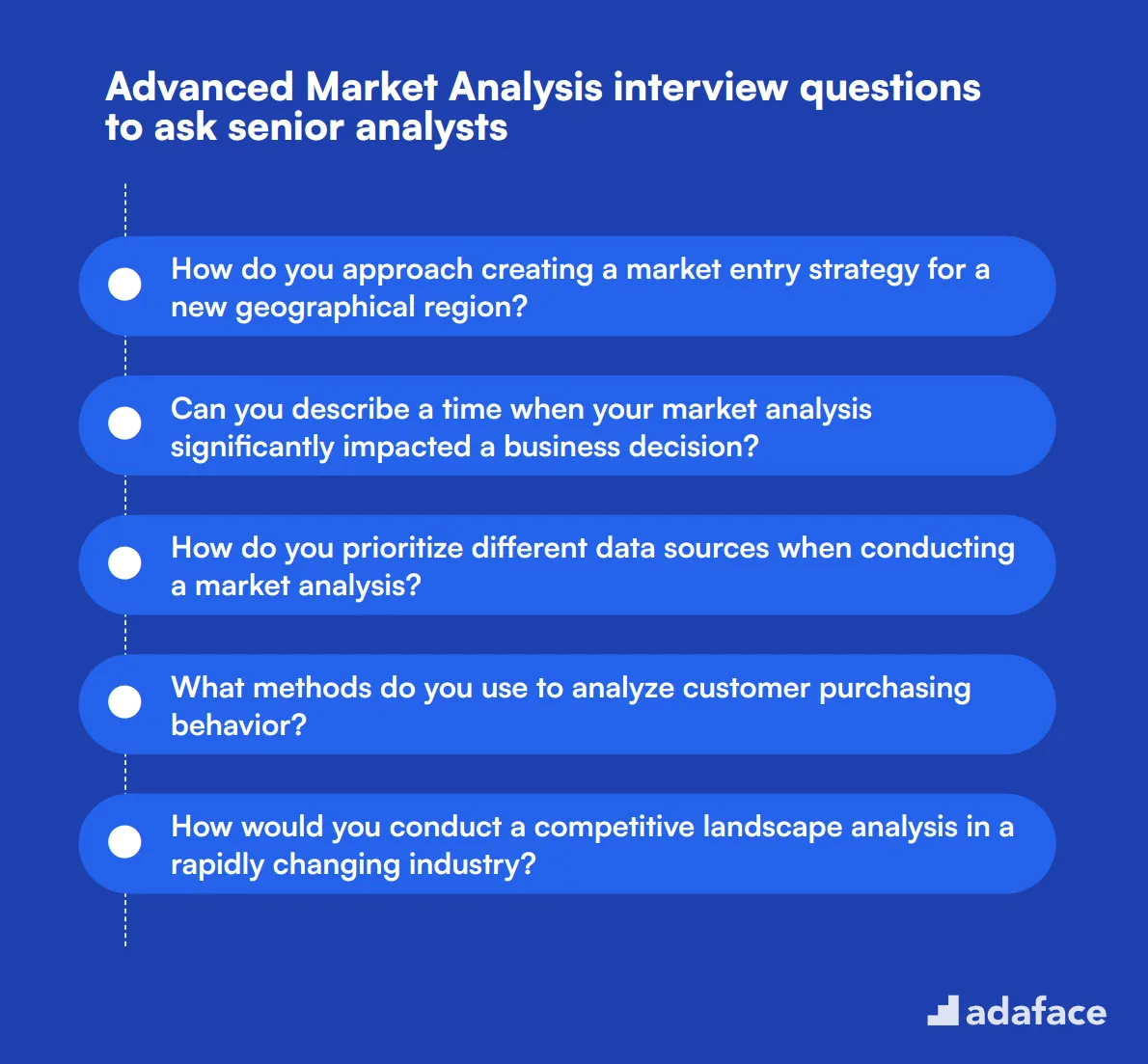
To ensure you're hiring top-notch senior analysts, it's crucial to ask the right questions during the interview process. These 18 advanced Market Analysis interview questions will help you evaluate the candidates' expertise and strategic thinking, making sure they’re the best fit for your team. For additional guidance, consider reviewing our business analyst job description.
- How do you approach creating a market entry strategy for a new geographical region?
- Can you describe a time when your market analysis significantly impacted a business decision?
- How do you prioritize different data sources when conducting a market analysis?
- What methods do you use to analyze customer purchasing behavior?
- How would you conduct a competitive landscape analysis in a rapidly changing industry?
- How do you integrate qualitative data into your quantitative market analysis?
- Can you provide an example of how you used data visualization to present market insights?
- What strategies do you use to forecast long-term market trends?
- How do you manage and interpret big data sets in your market analysis?
- How would you evaluate the potential success of a marketing strategy in a new market?
- What approaches do you take when faced with incomplete or missing market data?
- How do you stay informed about regulatory changes that might impact market conditions?
- How do you assess the risks and opportunities in emerging markets?
- Can you explain your process for conducting a competitive benchmarking study?
- How do you evaluate the effectiveness of different distribution channels in a market?
- What role does consumer sentiment analysis play in your market analysis?
- How do you approach scenario planning in market analysis?
- Can you discuss a situation where you had to pivot your market strategy based on new data?
9 Market Analysis interview questions and answers related to market trends
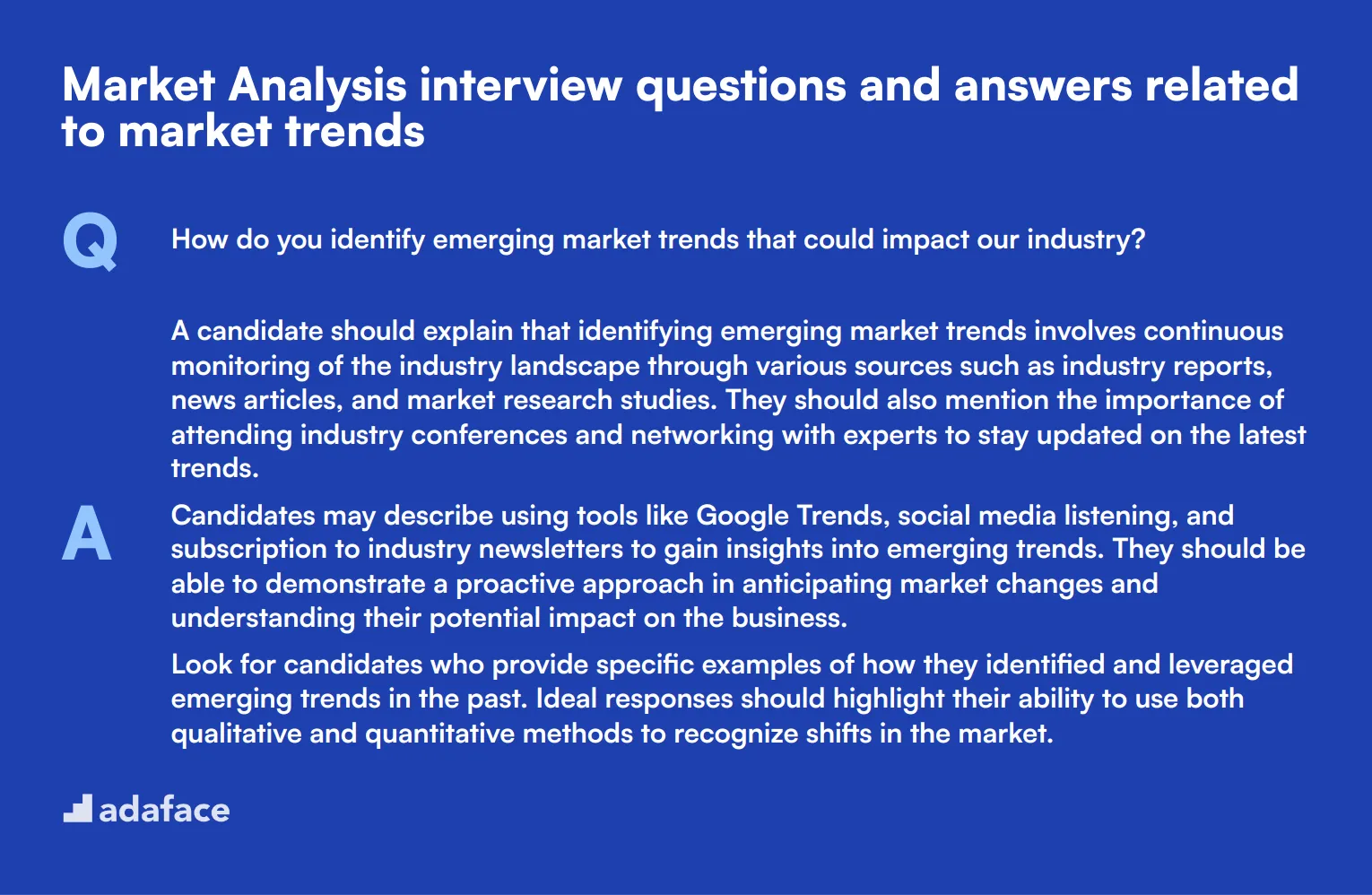
To help you gauge an applicant's ability to understand and analyze market trends, we've compiled a list of insightful questions and answers. These questions will help you uncover candidates' knowledge and skills in identifying and interpreting market trends effectively.
1. How do you identify emerging market trends that could impact our industry?
A candidate should explain that identifying emerging market trends involves continuous monitoring of the industry landscape through various sources such as industry reports, news articles, and market research studies. They should also mention the importance of attending industry conferences and networking with experts to stay updated on the latest trends.
Candidates may describe using tools like Google Trends, social media listening, and subscription to industry newsletters to gain insights into emerging trends. They should be able to demonstrate a proactive approach in anticipating market changes and understanding their potential impact on the business.
Look for candidates who provide specific examples of how they identified and leveraged emerging trends in the past. Ideal responses should highlight their ability to use both qualitative and quantitative methods to recognize shifts in the market.
2. Can you discuss a time when you identified a significant market trend and how it influenced your strategic recommendations?
Candidates should detail a specific instance where they identified a significant market trend, such as a shift in consumer behavior or a technological advancement. They should explain the methods they used to identify this trend and how they analyzed its potential impact on the business.
They should then describe the strategic recommendations they made based on their analysis. This could include changes to product offerings, marketing strategies, or entry into new markets. The candidate should emphasize the importance of data-driven decisions and how their recommendations positively impacted the business.
An ideal response will include measurable outcomes or improvements that resulted from their recommendations. Look for candidates who can articulate the connection between market trend analysis and strategic business decisions.
3. What sources do you rely on to stay updated about market trends?
Candidates should mention a mix of sources they use to stay informed about market trends, including industry publications, research reports, news outlets, and professional networks. They might also reference specific websites, newsletters, or professional associations relevant to their field.
In addition to traditional sources, candidates should highlight the importance of digital tools and platforms like social media, Google Trends, and online forums. They may also discuss subscribing to market research firms or using data analytics tools to gather real-time insights.
Look for candidates who demonstrate a comprehensive approach to staying updated, combining various sources to get a well-rounded view of market trends. Ideal responses should show a commitment to continuous learning and staying ahead of industry developments.
4. How do you differentiate between short-term fads and long-term market trends?
Candidates should explain that differentiating between short-term fads and long-term trends requires critical analysis and data validation. They might mention looking at historical data to identify patterns and using tools like trend analysis and forecasting models to assess the longevity of a trend.
They should also discuss the importance of understanding the underlying drivers of a trend. Long-term trends are typically driven by factors such as technological advancements, demographic shifts, or changes in consumer preferences, whereas short-term fads often lack these deeper drivers.
An ideal response will include examples of how they have distinguished between fads and trends in the past. Look for candidates who can articulate their analytical approach and demonstrate a deep understanding of market dynamics.
5. How do you incorporate market trends into your strategic planning process?
Candidates should describe their process for integrating market trends into strategic planning. This includes conducting a thorough market analysis to identify relevant trends and assessing their potential impact on the business. They should also explain how they prioritize trends based on factors like market size, growth potential, and alignment with company goals.
They might mention using tools like SWOT analysis, PEST analysis, or scenario planning to evaluate market trends and develop strategic initiatives. The candidate should emphasize the importance of aligning market trends with the company's overall strategy and objectives.
Look for candidates who can provide specific examples of how they have incorporated market trends into strategic plans. Ideal responses should demonstrate their ability to use market insights to drive business growth and innovation.
6. Can you explain how you use data visualization to present market trend insights?
Candidates should discuss the importance of data visualization in making market trend insights more understandable and actionable for stakeholders. They might mention using tools like Tableau, Power BI, or Excel to create visual representations of data, such as charts, graphs, and dashboards.
They should describe their approach to selecting the right visualization techniques based on the type of data and the audience. For instance, using line charts to show trends over time or bar charts to compare different segments. The candidate should emphasize clarity and simplicity in their visualizations to ensure the insights are easily interpretable.
Look for candidates who can provide examples of how they have used data visualization to communicate complex market trends effectively. Ideal responses should demonstrate their ability to translate data into actionable insights that drive business decisions.
7. How do you ensure your market trend analysis is accurate and reliable?
Candidates should explain their methods for ensuring the accuracy and reliability of their market trend analysis. This includes using multiple data sources to cross-verify information, applying statistical methods to validate data, and continuously updating their analysis with the latest information.
They might also mention the importance of staying objective and avoiding biases in their analysis. This involves critically evaluating sources, questioning assumptions, and using a systematic approach to data collection and analysis.
Look for candidates who can articulate their commitment to accuracy and reliability in their market trend analysis. Ideal responses should highlight their attention to detail and their ability to produce high-quality, data-driven insights.
8. What strategies do you use to forecast long-term market trends?
Candidates should describe their strategies for forecasting long-term market trends, which might include using historical data, trend analysis, and predictive modeling techniques. They should explain how they identify key drivers and indicators that influence long-term trends.
They might also mention conducting scenario planning to explore different future possibilities and assess their potential impact on the market. The candidate should emphasize the importance of continuously monitoring and updating forecasts based on new data and emerging trends.
Look for candidates who can provide examples of successful long-term market forecasts they have made in the past. Ideal responses should demonstrate their ability to use advanced analytical techniques to anticipate future market developments.
9. How do you use [qualitative data](https://www.adaface.com/blog/skills-required-for-business-analyst/) to analyze market trends?
Candidates should explain the role of qualitative data in analyzing market trends, such as gathering insights from customer interviews, focus groups, and expert opinions. They should describe their methods for collecting and analyzing qualitative data to identify patterns and trends.
They might mention using techniques like content analysis, thematic analysis, or sentiment analysis to interpret qualitative data and extract meaningful insights. The candidate should emphasize the importance of combining qualitative data with quantitative data to get a comprehensive view of market trends.
Look for candidates who can provide examples of how they have used qualitative data to enhance their market trend analysis. Ideal responses should demonstrate their ability to integrate diverse data sources and produce well-rounded insights.
12 Market Analysis interview questions about industry insights
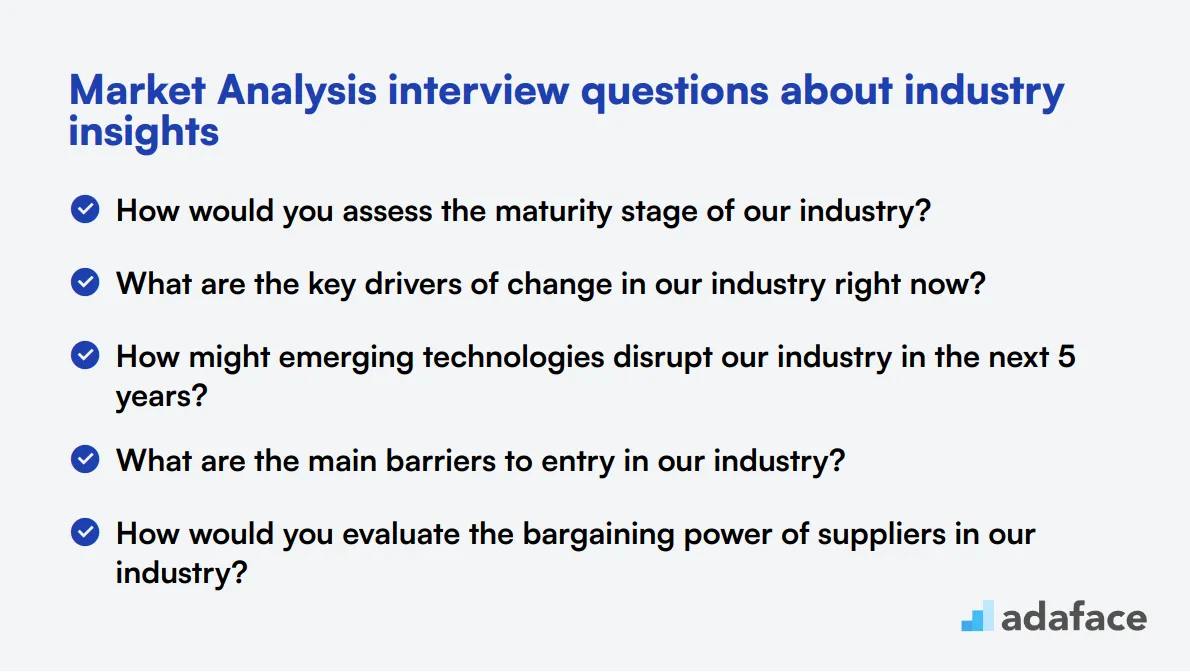
To gauge candidates' industry insights and understanding of market dynamics, consider asking these 12 market analysis interview questions. These questions will help you assess the applicant's ability to analyze industry trends, competitive landscapes, and market opportunities.
- How would you assess the maturity stage of our industry?
- What are the key drivers of change in our industry right now?
- How might emerging technologies disrupt our industry in the next 5 years?
- What are the main barriers to entry in our industry?
- How would you evaluate the bargaining power of suppliers in our industry?
- What industry-specific regulations do you think have the most impact on our business?
- How would you assess the threat of substitute products in our market?
- What do you think are the most significant challenges facing our industry today?
- How would you go about identifying potential strategic partnerships within our industry?
- What industry benchmarks or KPIs do you consider most relevant for our business?
- How would you analyze the impact of economic cycles on our industry?
- What methods would you use to forecast industry growth rates?
Which Market Analysis skills should you evaluate during the interview phase?
While a single interview may not reveal every aspect of a candidate's capabilities, certain skills in Market Analysis stand out as essential for success in the role. Focusing on these core skills during the interview process can help you accurately gauge a candidate's potential and fit within your team.
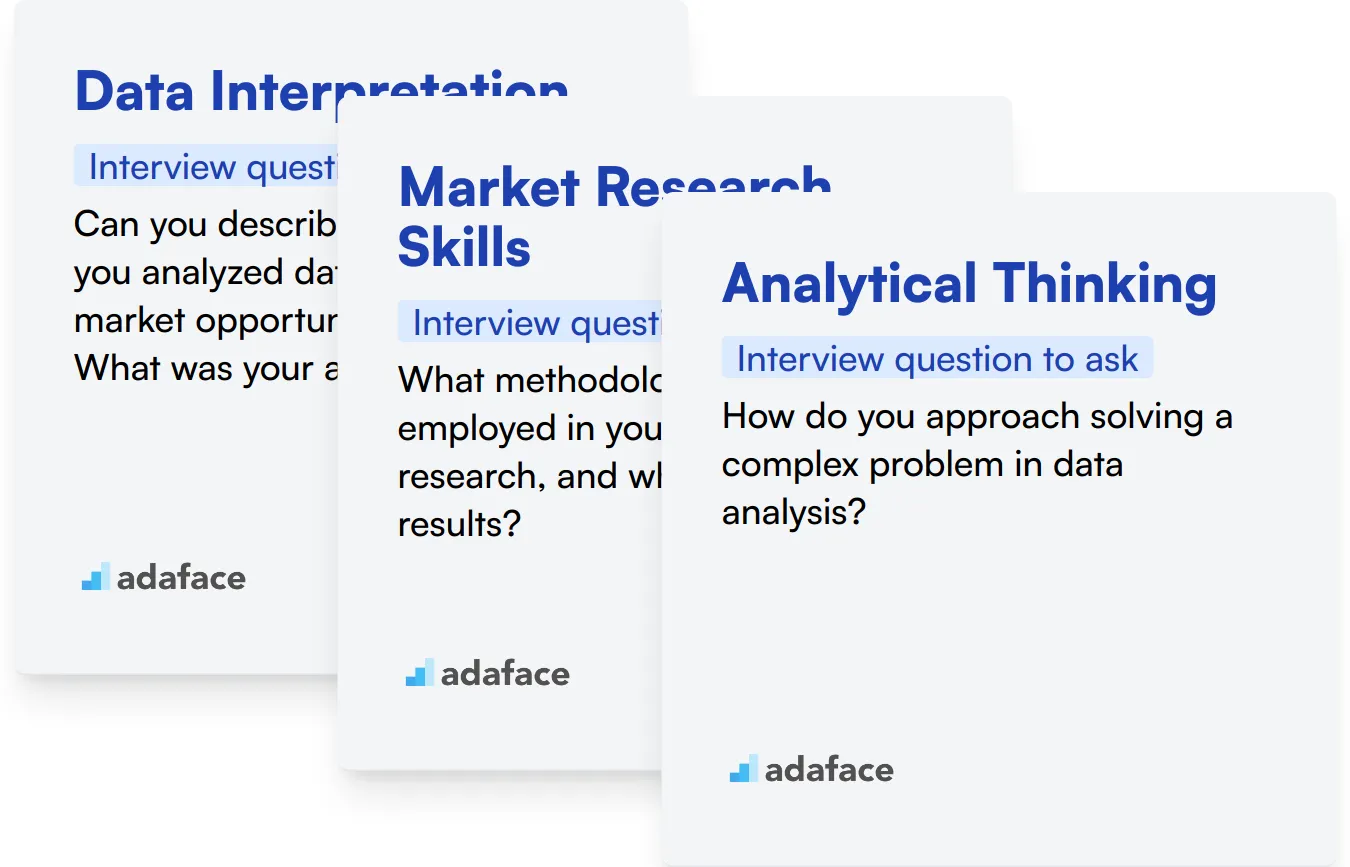
Data Interpretation
To effectively evaluate this skill, consider using an assessment test that includes relevant multiple-choice questions. For instance, you can use our Data Interpretation test to filter candidates based on their ability to interpret data accurately.
Additionally, you might ask targeted interview questions to further assess this sub-skill. One effective question to pose is:
Can you describe a time when you analyzed data to identify a market opportunity or trend? What was your approach?
When asking this question, look for candidates to articulate a clear methodology in their data analysis process. Pay attention to how they prioritize data sources, the tools they used, and the outcomes of their analysis. This will provide insight into their analytical thinking and problem-solving capabilities.
Market Research Skills
Utilizing an assessment test for market research skills can streamline your selection process. Consider our Marketing Analysis test to evaluate candidates' aptitude in this critical area.
Furthermore, targeted interview questions can help gauge their practical experience. A relevant question could be:
What methodologies have you employed in your market research, and what were the results?
In their response, watch for candidates to discuss specific methodologies like surveys, focus groups, or competitive analysis. Their ability to connect research methods to actionable insights will indicate their depth of understanding and experience.
Analytical Thinking
An assessment test focused on analytical thinking can be invaluable in your hiring process. You might want to implement an assessment that includes analytical reasoning questions to filter candidates effectively.
Additionally, you can ask candidates specific questions to assess their analytical mindset. For example:
How do you approach solving a complex problem in data analysis?
When candidates answer, observe their thought process and approach to problem-solving. Look for structured reasoning and an ability to articulate their methods clearly, which can indicate strong analytical capabilities.
3 tips for using Market Analysis interview questions
Before you start putting what you've learned to use, here are our tips for effectively using Market Analysis interview questions.
1. Utilize skills tests before interviews
Skills tests are a great way to evaluate a candidate's proficiency before the interview. They help you weed out unqualified candidates early in the process.
Consider using tests like the Market Research Test or the Business Analyst Test to assess specific skills relevant to Market Analysis roles.
By utilizing these tests, you can better understand a candidate’s strengths and abilities before diving into more in-depth interview questions.
2. Select the right interview questions
You don’t have enough time to ask every possible question, so it’s crucial to pick the right ones. Selecting a balanced mix of questions will help you evaluate candidates on important fronts.
Consider incorporating questions from related fields such as Data Analysis Interview Questions or Data Science Interview Questions to get a more comprehensive view of the candidate.
3. Ask follow-up questions
Interview questions alone won't give you the full picture. To understand a candidate's depth, it's important to ask follow-up questions.
For example, if a candidate mentions using SWOT analysis in a previous role, follow up with, 'Can you give me a specific example of how you used SWOT analysis to make a business decision?' This helps you gauge their practical experience and problem-solving skills.
Leverage Skill Tests and Interview Questions for Hiring Market Analysts
When hiring for roles requiring market analysis expertise, verifying the candidates' capabilities is key. The most reliable way to assess these skills is through targeted skill tests. Consider using our Market Research Test or Business Analyst Test to gauge the essential competencies effectively.
After implementing these tests, you can efficiently shortlist the top candidates for interviews. To streamline this hiring process further, sign up at our assessment platform where you can manage and evaluate all your candidate assessments in one convenient location.
Market Research Test
Download Market Analysis interview questions template in multiple formats
Market Analysis Interview Questions FAQs
A good market analyst should have strong analytical skills, data interpretation abilities, knowledge of research methodologies, and excellent communication skills to present findings effectively.
Ask questions about current market trends, recent industry developments, and their understanding of key players in the market. This will help gauge their industry awareness and passion for the field.
When interviewing junior analysts, focus on basic concepts and methodologies. For senior analysts, emphasize advanced techniques, strategic thinking, and leadership abilities in market analysis projects.
Technological proficiency is highly important. Candidates should be familiar with data analysis tools, statistical software, and market research platforms to effectively collect, analyze, and present data.

40 min skill tests.
No trick questions.
Accurate shortlisting.
We make it easy for you to find the best candidates in your pipeline with a 40 min skills test.
Try for freeRelated posts
Free resources




